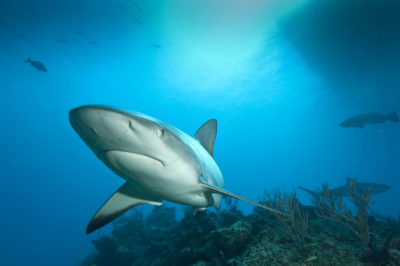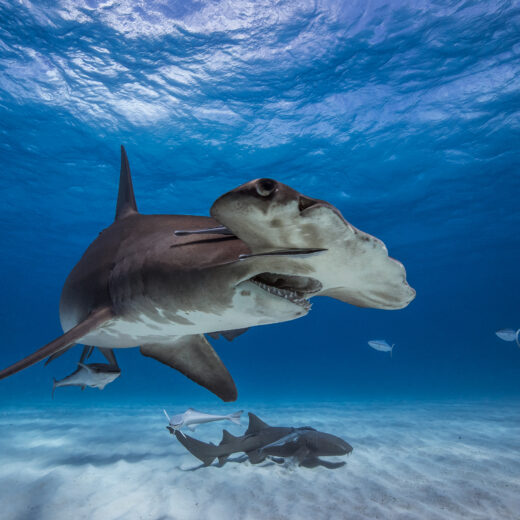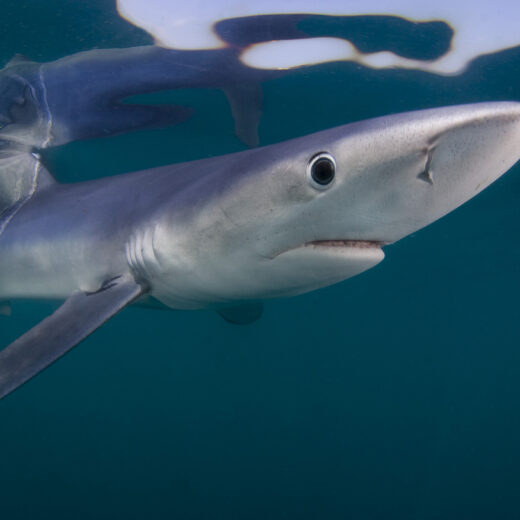
Today, leading Chinese stars – Yao Ming, Li Ning and Liu Huan jointly launched WildAid’s public awareness campaign to protect endangered species and in particular sharks from high levels of consumption, which threaten them with extinction.
NBA star, Yao Ming, one of China’s greatest exports; Li Ning, Olympic gold medallist and inspirational entrepreneur, and Liu Huan, one of the most respected and popular musicians, declared their support for wildlife conservation by signing WildAid’s Global People’s Petition for Wildlife. They have all filmed TV messages, some of which are currently being shown on CCTV and other networks.
WildAid aims to raise international awareness and concern about the illegal trade in endangered species; to highlight shark conservation in particular and to communicate to the public that individual purchasing decisions can help save sharks and other species.
“For our future, join me to protect endangered wildlife.” Yao said in his message featuring him saving an elephant.
“When the buying stops, the killing can too.” Liu Huan said in his message to invite viewers to join in helping our endangered species.
“When we all come together, we can do anything.” Li Ning urges consumers to stop buying threatened wildlife products as he trains future Olympic gymnasts.
Sharks are fast disappearing from our oceans due to overfishing. Millions are “finned” around the world every year. The shark is hauled up onto the deck, its fins are sliced off, often while the shark is still living, and the animal is then thrown back into the sea to die a slow and painful death.
“The public needs to understand the damage being done to marine ecosystems by the massive increase in consumption of shark fin soup. If sharks are to survive we need to see a decline in shark fin consumption and new actions by government to control imports and consumption. China alone can save the sharks.” said Steve Trent, President, WildAid.
There is nothing more important in this campaign than your voice – please make it heard by signing now and by helping us get the word out to your friends and local community.
Sharks and their products:
The UN Food and Agriculture Organisation (FAO) estimate that 100 million sharks are caught every year, although experts estimate that the number could be twice as high. The FAO has warned that: “unless efforts are undertaken promptly to halt growing catches, the future of many more shark populations is very bleak”.
Sharks worldwide now face unprecedented pressure, due in large part to skyrocketing demand for their fins for shark fin soup. In an effort to feed demand and maximize profits, fishing operations often “fin” sharks at sea and dump their bodies overboard—a practice which is wasteful and highly unsustainable.
Shark fins represent approximately 5% of the shark’s body weight therefore 95% of the shark is being wasted.
An estimated 10,000 tonnes of shark fins are traded around the world every year. Mainland China is now the largest importer.
Shark fin soup is a luxury food product consumed principally by Asian cultures. Shark fin soup can cost US$100 dollars in Hong Kong SAR restaurants.
In contrast to the luxury food markets for shark fin soup, increasing numbers of subsistence fishermen in poorer developing countries such as India, Kenya and Brazil depend on shark meat as a low cost – previously sustainable – source of protein. As human population pressure and the decline of some terrestrial species drives increased demand for such subsistence food sources, commercial industrial fishing, often by foreign fleets, is contributing to the collapse of shark populations through by-catch and “finning”.
Marine Reserves are a major target for illegal fishing. Many of the world’s marine protected areas, such as the Galapagos Islands and Cocos Island are now regularly fished illegally for increasingly valuable shark fins. Competition for shark fins has led to widespread corruption, gangland wars and contract killings.
Sharks are very slow to reproduce and targeted populations collapse rapidly. Some species can live for 60 or more years. Many do not reproduce until they are in their second decade of life. Often, after many months of pregnancy, a female shark will give birth to only a few young. Many of these will die before they have a chance to reproduce.
Shark Populations:
110 species of sharks are now classified as endangered, threatened or vulnerable.
Some shark populations have declined by more than 80% in the past 50 years. A number of studies have shown drastic declines, since 1986 of: 89% decline in hammerhead sharks in the NW Atlantic 79% decline in great white sharks in the NW Atlantic
International measures to protect sharks:
Various multi-lateral agreements, organisations and conventions have recently begun to take note of the urgent need for global shark conservation.
1999: The UN Food and Agriculture Organisation (FAO) adopted an International Plan of Action for Sharks (IPOA), which required that its member States devise and implement National Plans of Action for Sharks.
2003: The UN General Assembly adopted a resolution recommending that member States ban the targeting of sharks for their fins.
November 2004: The International Commission for the Conservation of Atlantic Tunas (ICCAT) adopted a resolution recommending that member States require boats fishing in the Atlantic Ocean – in fisheries managed by ICCAT – to land fins and carcasses together, with the fins weighing no more than 5% of the weight of dressed carcasses. In the same month, the World Conservation Union, made up of over 1000 governmental and non-governmental organizations from over 140 countries passed a resolution recommending that all States ban shark finning and require shark fins to be landed attached to their bodies.
2005: Only three species of shark – the basking shark, the whale shark and the great white shark – are protected globally from over-exploitation in international trade. Now listed on Appendix II of the Convention on International Trade in Endangered Species (CITES), countries exporting live specimens of these species, or their body parts, must first show that their removal will not be detrimental to the species in the wild. Countries and regions that have finning regulations include American Samoa, Australia (in most States & Territories), Brazil, Canada, Colombia (only in protected areas), Costa Rica, Ecuador, Nicaragua, Oman, Palau, South Africa, Spain, USA and the European Union.
Chinese Laws:
The Law of Wild Animal Protection of the People’s Republic of China came into force on 8th November 1988. It provides that the state forest and fisheries administrations are responsible for the management of land animals and aquatic animals; the state carries out the policy of enhancing resource conservation, actively domesticating, breeding and rationally utilising fish stocks.
Since 1st January 1998, all imports, exports and re-exports of shark and shark products must first be approved by the Bureau of Fisheries, Ministry of Agriculture.
The Fisheries Law of the People’s Republic of China, which came into force on 20 January 1986, is the highest national law governing fisheries management in China. It stipulates that permits from fishery management authorities have to be obtained in order to exploit shark resources, as for all other fish.
WildAid is an international environmental organisation working to provide direct support for wildlife and habitat conservation. WildAid conducts research, investigations and campaigns for the effective conservation of our natural world.
Stay in touch and get the latest WildAid updates.
SIGN UPAbout WildAid
WildAid is a non-profit organization with a mission to protect wildlife from illegal trade and other imminent threats. While most wildlife conservation groups focus on protecting animals from poaching, WildAid primarily works to reduce global consumption of wildlife products such as elephant ivory, rhino horn and shark fin soup. With an unrivaled portfolio of celebrity ambassadors and a global network of media partners, WildAid leverages more than $308 million in annual pro-bono media support with a simple message: When the Buying Stops, the Killing Can Too.
Journalists on deadline may email communications@wildaid.org


